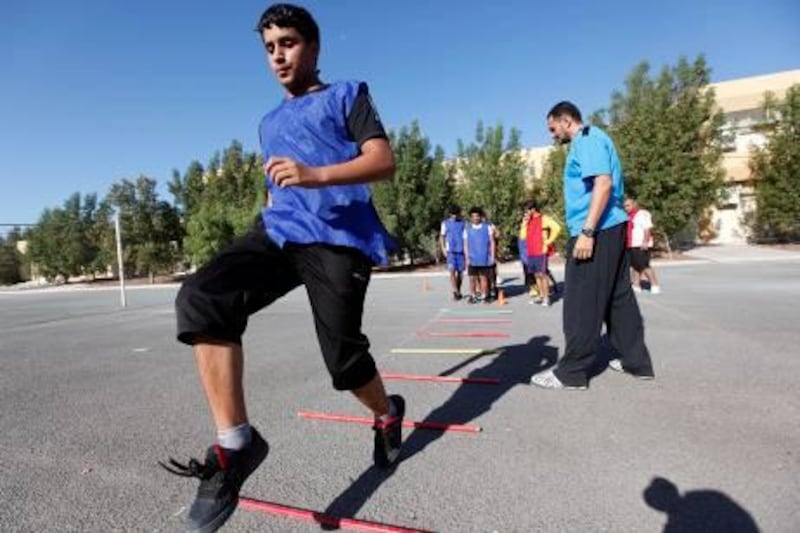DUBAI // A restructuring of physical education classes in state schools has been slowed by problems in recruiting teachers from the region, the Ministry of Education says.
As many as 100 schools in Dubai and the Northern Emirates have no physical education teachers on staff, three months after the start of the school year.
"There are no training programmes or higher-education courses in physical education in the UAE," said Jamal Almidfa, who oversees PE teacher training at the ministry.
"Most of the PE teachers are from other Arab countries but it is getting difficult to recruit from those countries now."
Last year, the ministry increased the number of PE classes from one a week to three in primary schools and two in secondary schools. Sports including tennis, wrestling and fencing were introduced.
"The plan is to increase the number of options and classes but that is not immediately possible because right now there is a lot of pressure on the existing teachers," said Mr Almidfa.
He said some schools had only one sports teacher, which was not enough. At least two were needed in 460 Government schools in Dubai and the Northern Emirates.
The move to increase PE classes and the quality of teachers comes as part of a government drive to reduce the high incidence of obesity and diabetes among the young.
A Ministry of Health survey last year found 38.4 per cent of pupils were overweight and 14.4 per cent obese.
"This cannot be brought down unless you have well-qualified teachers and programmes," said Azza El Din, the instructional adviser at the Mariya Al Qubtiyah public school in Dubai.
"How can you engage pupils in sports lessons if you do not have the right teachers to guide them?
"Yes, there is a shortage because there are no higher education programmes to support PE careers here. If such courses were launched at universities they could also support constant professional development of existing teachers so they adopt modern techniques."
Adel Al Qeisi, a teacher-development specialist at Al Noaman Bin Basheer secondary school in Ajman, said PE teachers needed to set a good example.
"We need teachers who are fit and properly trained to motivate children into competitive games," Mr Al Qeisi said.
Mohamed Ali Mohamed, the ministry's PE and health senior supervisor, said it usually hired qualified teachers in Egypt, Jordan and Tunisia.
"But we need more national teachers to fill the gaps and this is not happening because there is no teaching college that offers PE as a major," Mr Mohamed said.
There are fewer than 70 Emirati PE teachers in state schools. Most of these graduated from UAE University (UAEU), which once offered a degree in PE but closed it down more than a decade ago because of accreditation issues.
Dr Abdulsalam Al Zuaabi, the assistant professor in the faculty of education at UAEU, said this was a cause of concern and the university was hoping to address it soon.
"We have been working to reinstate the programme for a while and have submitted a proposal for the course. We hope to have something up and running soon," he said.
Dr Al Zuaabi added the delay in addressing the matter was caused by the low priority given to sports and physical education by society.
"It has been ignored for a long time as people do not immediately see the benefits of PE," he said. "Parents do not push for it because it is often considered more of a hobby than something for good health or a profession."
Dr Al Zuaabi said he hoped the programme, when introduced, would attract male and female students.
"We have gone through several models from US universities to come up with ours," he said. "It will not only extend technical skills in games to students but also teach them the science behind PE."
Mr Mohamed said a study conducted a few years ago showed a high interest in PE courses among state school pupils.
"But they cannot take that interest further because there are no higher education options," he said.
Unless new sports science majors were introduced, the related professions would not be taken seriously, Mr Mohamed said. "This has a knock-on effect on pupils' health and well-being as well."






